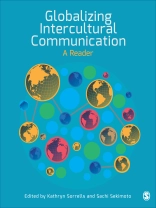Translating Theory into Practice
Globalizing Intercultural Communication: A Reader introduces students to intercultural communication within the global context, and equips them with the knowledge and understanding to grapple with the dynamic, interconnected and complex nature of intercultural relations in the world today. This reader is organized around foundational and contemporary themes of intercultural communication. Each of the 14 chapters pairs an original research article explicating key topics, theories, or concepts with a first-person narrative that brings the chapter content alive and invites students to develop and apply their knowledge of intercultural communication. Each chapter’s pair of readings is framed by an introduction highlighting important issues presented in the readings that are relevant to the study and practice of intercultural communication and end-of-chapter pedagogical features including key terms and discussion questions.
In addition to illuminating concepts, theories, and issues, authors/editors Kathryn Sorrells and Sachi Sekimoto focus particular attention on grounding theory in everyday experience and translating theory into practice and actions that can be taken to promote social responsibility and social justice.
قائمة المحتويات
Introduction – Kathryn Sorrells & Sachi Sekimoto
Chapter 1: Studying and Practicing Intercultural Communication
Globalizing Intercultural Communication: Traces and Trajectories – Kathryn Sorrells & Sachi Sekimoto
‘Praxis What You Breach’: Intercultural Praxis, Impersonation, and Stereotyping – Gordon Nakagawa
Chapter 2: Challenges and Barriers to Intercultural Communication
Diverse Understandings of a ‘Post-Racial’ Society – Mark P. Orbe
The Black Kat in the Hat: Tales of Cultural/Racial Encounter and Challenge – Bryant Keith Alexander
Chapter 3: History, Power, and Globalization
Out of Modernity into Deep Ancestry: A Love Story – S. Lily Mendoza
Building Bridges along the Edges of Culture – Nilanjana R. Bardhan
Chapter 4: Identities in the Global Context
A View from the Other Side: Technology, Media, and Transnational Families in Mexico-U.S. Migration – Gerardo Villalobos-Romo & Sachi Sekimoto
‘But, I Ain’t Your Geisha!”: (Re)Framing the ‘Femme’ Gay Asian Male Body in the Global Context – Shinsuke Eguchi
Chapter 5: Intersectionality, Identity, and Positionality
Toward Thick(er) Intersectionalities: Theorizing, Researching, and Activating the Complexities of Communication and Identities – Gust A. Yep
How I Came to Know: Moving through Spaces of Post/colonial Encounters – Eddah M. Mutua
Chapter 6: Language and Power
Language and Identity in the United States and Taiwan: Negotiating Power and Differential Belonging in a Globalized World – Melissa L. Curtin
Black Like Me, Black Like I Am! The Language and Memories of Race in Higher Education – Christopher Brown
Chapter 7: Cultural Space and Intercultural Communication
The Intersections of Race and Space: A Case Study of a Washington State Farm Community – Joshua F. Hoops
Whiteness as Pedagogical Performance: A Critical Reflection on Race and Pedagogy – Richie Neil Hao
Chapter 8: Intercultural Relationships
‘We Get Bad Looks, All the Time”: Ideologies and Identities in the Discourses of Interracial Romantic Couples – Yea-Wen Chen & Chie Torigoe
Intercultural Allies Dancing with Difference: International Peace Initiatives, Kenya – Mary Jane Collier & Karambu Ringera
Chapter 9: Intercultural Communication in the Workplace
“A Person Who Covers a Post”: An Exploration of Mexican Maquiladoras Workers’ Neoliberal Identity Negotiations – Carlo Ammatuna & Hsin-I Cheng
From Mississippi to Hong Kong: The Power of Intercultural Communication in the Workplace – Donna M. Stringer & Andy Reynolds
Chapter 10: Border Crossing and Intercultural Adaptation
The Migrant Self: Intercultural Adaptation as Narrative Struggle – Zornitsa D. Keremidchieva
On Becoming Japersican: An Autoethnography of Cultural Adaptation, Intercultural Identity, and Transnationalism – Sachiko Tankei-Aminian
Chapter 11: Popular Culture, Media, and Globalization
Remagining a Nation: Neoliberalism and Media′s Impact on Youth′s Imaginaries in India – Sheena Malhotra
Migrant Diaries: Communicating in Pop Culture Nation – Chigozirim Ifedapo Utah
Chapter 12: New Media in the Global Context
Reggae 3.0: Social Media and the Consumption of Jamaican Popular Culture – Nickesia S. Gordon
Puerto Rican Punks, Globalization, and New Media: A Personal Account – Rubén Ramírez-Sánchez
Chapter 13: Intercultural Conflict in the Global Age
Transnational Practices of Communication and Social Justice: Indigenous Mexican Immigrants in the United States – Antonieta Mercado
Negotiating Intercultural Conflict: A Middle Eastern, Black, Muslim Male′s Perspective in Post-9/11 United States – Taj Suleyman
Chapter 14: Intercultural Alliances for Social Justice
“The Unrelenting Social Conscience of the City”: Strategies and Challenges of a Multi-Issue Social Change Organization – Sara De Turk
A South Asian American Muslim Man′s Global Journey through Hip Hop Activism – Amer F. Ahmed
عن المؤلف
Sachi Sekimoto (Ph D, University of New Mexico, 2011) is assistant professor of communication studies at Minnesota State University, Mankato. Her research focuses on theorizing and critiquing the materiality of culture, identity, ideology, and power through critical and phenomenological perspectives. Her scholarly work has appeared in Journal of International and Intercultural Communication and Communication Quarterly, in which she developed alternative ways of theorizing identity by focusing on the phenomenological significance of spatial, temporal, and embodied experiences in intercultural and transnational contexts. She is currently writing about and researching the cultural politics of the senses, examining the social and embodied construction of sensory experiences as a source of meaning, knowledge, and production/reproduction of power. She teaches undergraduate and graduate courses in intercultural communication, gender and communication, communication theory, critical pedagogy, and courses related to cultural studies and globalization.












